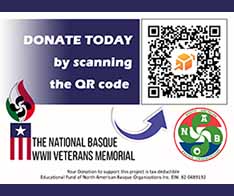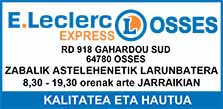Norman Helgason / norman@thereflector.com. The story follows a horse named Zaldi (“horse” in Basque) as he leaps into the Pegasus constellation. The book combines Merrilee’s equine artwork and Basque roots into a story that imagines how her ancestors, the indigenous people of Western Europe, may have told their creation story.
Merrilee’s grandparents emigrated from Basque Country in northern Spain, where dictator Francisco Franco once banned the Basque language and stripped families of cultural rights. Their history left a lasting mark on her family.
“They are one of the oldest indigenous peoples of Western Europe. Franco and Hitler tried to exterminate them, so that’s how my parents ended up coming to America,” she said.
Merrilee recently traveled through Bilbao and surrounding towns to retrace her grandparents’ steps, visiting cemeteries where her ancestors are buried. That trip deepened her sense of what had been lost and what could still be carried forward.
“Basque folklore was destroyed. So this is a might-have-been tale. We cannot say yes, it was told, but neither can anybody else tell us it was not,” she said.
Merrilee discovered her talent for art as early as 2015, and has been a member of the Ridgefield Arts Council for years. Horses have always been a big part of her life as she once owned two rescues, which became a major inspiration for her art. Over the years, she's sold nearly 300 pieces to support local animal rescues.
The idea for “Zaldi Danced” began when Terryl saw one of her horse paintings.
“My brother saw one of my art pieces, I primarily do horses … and said, ‘this inspires a story,’” she said.
During the COVID-19 lockdown, the siblings began shaping the book together. Merrilee provided her years of artwork, while Terryl edited and composited the pieces into a visual arc.
The story also draws inspiration from cave paintings left by the Basques’ ancient ancestors, where horses were among the most frequently depicted animals. Translator Olatz Sanchez-Txabarri joined the project to render the text into Basque, ensuring the book could be read in both languages.
The team designed “Zaldi Danced” as a tool for children and language learners. The finished book presents English and Basque text side by side so readers can compare phrases directly. At times, the translation reshaped the story itself, as certain concepts carried different nuances.
Hearing the book read aloud in Euskara was a powerful moment for her.
“That was just thrilling. Basque is a very difficult language, and they talk fast,” she said. “The whole thing was just exciting and fun.”
Each spread also contains a hidden lauburu, an ancient Basque symbol used to represent life or balance, inviting readers to look again on each page.
Merrilee credits Ridgefield’s arts community for giving her the space to grow, from library shows to local multicultural events. She and her brother will appear in Downtown Ridgefield during the Ridgefield Multicultural Festival held on Saturday, Sept. 6, for a book signing.
Another gift of “Zaldi Danced,” she said, is the chance to create alongside her only sibling.
“It’s a real gift that in our old age, our second childhood, as we call it, that we can have the time to create something together,” Merrilee said.
Part of the book’s profits, 10%, will benefit Ripley’s Horse Aid Neglect Prevention Program, which provides short-term assistance to horse owners in financial distress. Readers can learn more at ccehc.org/ripley-s-aid.
“Zaldi Danced” is available for purchase on Amazon at amazon.com/Zaldi-Danced-Zaldik-Dantzatu-Zuen/dp/B0FGNN71RK.



 Enviar a un amigo
Enviar a un amigo Añadir comentario
Añadir comentario








